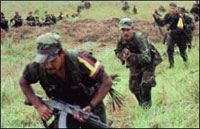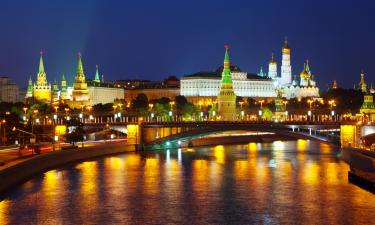Colombia releases rebel prisoners, waits for gesture from insurgent groups
Paris brokers a deal to release a French-borned hostage held by the FARC since 2002.

Colombian President Alvaro Uribe made the first move in his attempt to exchange imprisoned Marxist militants for dozens of rebel hostages, including three Americans and a French-Colombian ex-presidential candidate. On Tuesday, 56 rebels - part of a total of 193 in the process of being released -- were escorted out of prison and were taken in buses to a military airfield in Bogota from which they will be flown to Chicoral, in the central department of Tolima. On Wednesday, another group left prison.
Rebels released this week are high-profile militants of the Revolutionary Armed Forces of Colombia (FARC), the largest guerrilla group operating in the embattled South American nation. Uribe believes the gesture will lead to a swap, which has been openly claimed by foreign nations, specially in Washington and Paris.
On Monday, the Colombian government had released Rodrigo Granda, a FARC representative to foreign governments. Granda thanked French President Nicolas Sarkozy for his freedom, but said he was not entitled by the FARC to hold negotiations with Colombian officials.
The government hopes the FARC will free 56 high-profile hostages, including three U.S. contractors captured in 2003 after their plane crashed during an anti-drug mission, and Betancourt, whose kidnapping while running for president in 2002 sparked international interest in the hostage plight.
However, no signals came from the FARC about a prompt release of hostages.
Uribe said he hoped Granda, known as FARC's "foreign minister," would now serve as a peace broker. "The government is giving him guarantees so that he may promote peace," Uribe said on television late Monday. "The government trusts that he will not be involved in kidnappings, in assassinations." Sarkozy's office said the French president had "explicitly requested" Granda's release and welcomed Uribe's "very important and courageous decision."
Sarkozy "now hopes that this development will be heard by FARC" and that "they will respond," his office said Tuesday in a statement. France has been seeking Betancourt's release for five years.
Betancourt's mother, Yolanda Pulecio, welcomed Granda's release as a "very positive" step because FARC had signed off on it. "Yes, I don't think he could be released without that guarantee," she told reporters in Bogota. "Granda would never leave prison without the consent of the FARC leadership."
"We hold the FARC and other armed groups responsible for the health and welfare of the hostage U.S. citizens," said State Department spokesman Eric Watnik. Asked what about the unilateral release of jailed members of a rebel group the U.S. has listed a terrorist organization, he said: "That's a decision for the Colombian government."
"The United States will continue to work with the government of Colombia to bring to justice terrorists and narcotraffickers who committed serious crimes and to dismantle their criminal organizations," Watnik added.
In a statement carried by a Web site sympathetic to the rebels, the Revolutionary Armed Forces of Colombia, or FARC, said that the 200 prisoners the government plans to free in the next week were «deserters» who had «betrayed the FARC» or were innocent civilians falsely accused of being rebels.
Hernan Etchaleco
Subscribe to Pravda.Ru Telegram channel, Facebook, RSS!




